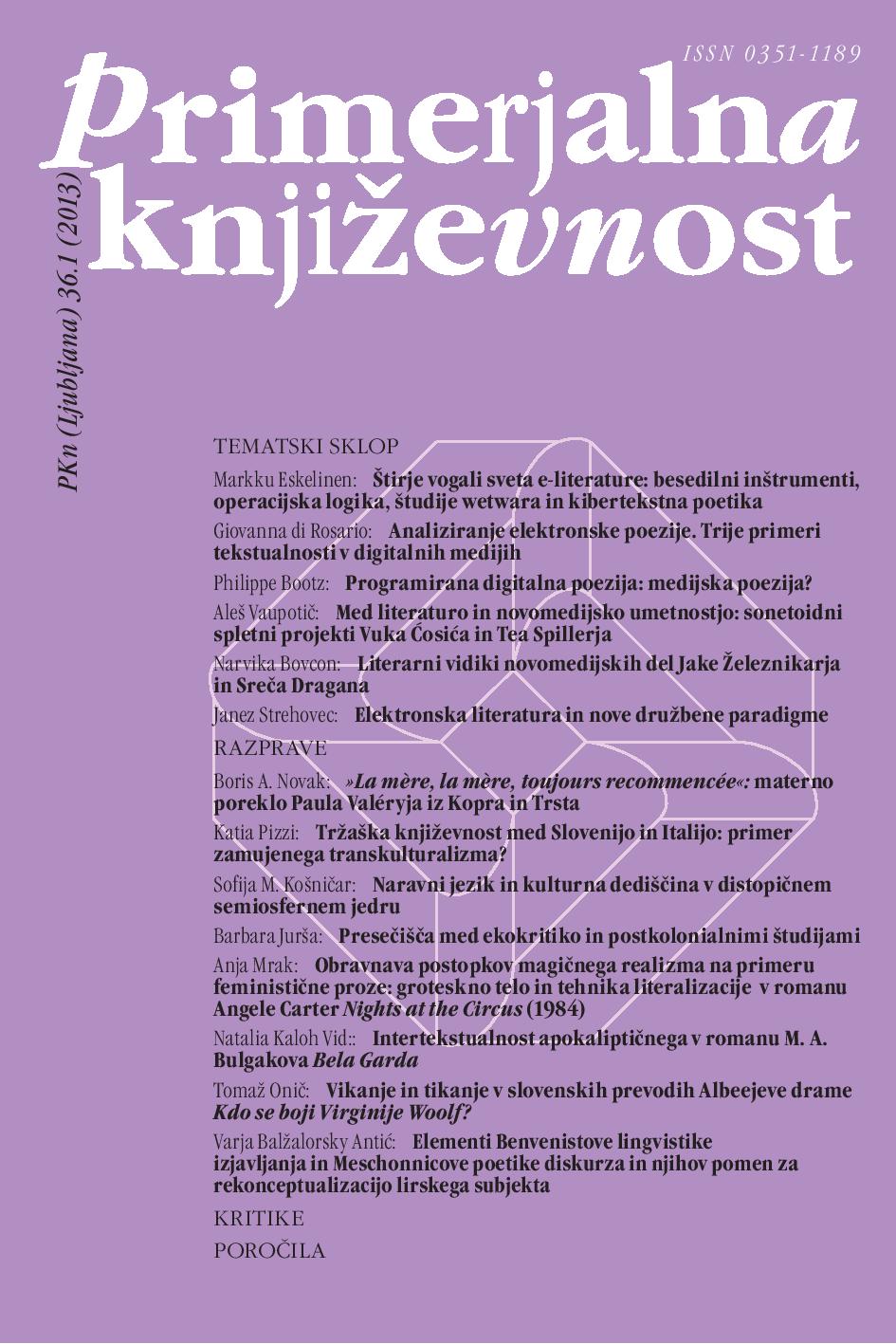Electronic Literature and New Social Paradigms
Keywords:
literature and society, digital art, new media, electronic literature, algorithmic culture, post-Fordism, new social paradigmsAbstract
Rather than being a continuation of print-based literature, e-literature is a novel practice of experimental writing that foregrounds the new media specificity and the new approaches to writing in programmable media by demonstrating that the institution of the author and literariness as we know it are at stake. Along with the new media specificity (e-literary text is displayed on the screen, stored in digital storage devices, and controlled by software), the e-literary text is embedded in the social in a way that demonstrates some of the key features of current social paradigms. This article explores the shifts of new social paradigms that have influenced e-literary writing and contributed to the birth of the e-literary world as an institution, which enables new media-shaped e-literary pieces to be recognized as works of e-literary art. In doing so, the concept of e-literary service is introduced to describe the specificity of e-literature in terms of goal-oriented and performative practice that leaves aside the institution of stable e-literary work. This article also places great emphasis on understanding the very specific nature of e-literature through its interactions with the new media art.References
Adorno, Theodor W. Aesthetic Theory. Minneapolis: University of Minnesota Press, 1997 [1970].
Balides, Constance. »Virtual Spaces and Incorporative Logics: Contemporary Films as Mass Ornaments.« MIT Communications Forum. Splet 13. apr. 2011. http://web.mit.edu/comm-forum/papers/balides.html.
Bauer Rene, Suter Beat. »AndOrDada.« 2008. Splet 24. feb. 2013. http://elmcip.net/creative-work/andordada-0.
Bell, Daniel. The Coming of Post-Industrial Society. A Venture in Social Forecasting. New York: Basic Books, 1973.
Beller, Jonathan: The Cinematic Mode of Production. Hannover in London: UP of New England, 2006.
Bookchin, Natalia. »Mass Ornament.« 2009. Splet 9. maj 2012. http://vimeo.com/5403546.
Bouchardon, Serge. »Touch, Toucher.« E-Literature Collection 2. Splet 13. feb. 2012. http://collection.eliterature.org/2/works/bouchardon_toucher.html.
Carpenter, C. R. »Along the Briny Beach.« Splet 13. feb. 2013. http://luckysoap.com/alongthebrinybeach/alongthebrinycredits.html.
Cayley, John. »Writing to be Found and Writing Readers.« Digital Humanities Quarterly 5.3 (2011). Splet 19. feb. 2013. http://digitalhumanities.org/dhq/.
Critical Art Ensemble. »Free Range Grain. 2003–2004.« Splet 28. feb. 2013. http://www.homeshopbeijing.org/nichilema/?page_id=58.
Debord, Guy. Družba spektakla. Ljubljana: ŠOU, 1999. (Koda).
Electronic Disturbance Theatre 2.0. 2007–2008. »Transborder Immigrant Tool.« Splet 26. jan. 2013. http://vimeo.com/27222287.
Eskelinen, Markku. Cybertext Poetics. The Critical Landscape of New Media Literary Theory. New York, London: Continuum, 2012.
Gadamer, Hans-Georg. Truth and Method. London: Sheed & Ward, 1975.
Galloway, Alexander R. Teorija video iger. Eseji o algoritemski kulturi. Ljubljana: Maska, 2011.
Gibson, William. Nevromant. Ljubljana: Cankarjeva založba, 1997.
Goriunova, Olga. »Autocreativity and Organisational Aesthetics in Art Platforms.« Fibreculture Journal, 17, 2011. Splet 14. apr. 2012.http://seventeen.fibreculturejournal.org/fcj-115-autocreativity-and-organisational-aesthetics-in-art-platforms/.
Jameson, Fredric. Postmodernizem. Ljubljana: Problemi – Razprave, 1992.
Johnson, Steven. Interface Culture. New York: HarperEdge, 1997.
Kane, Carolyn. »Dancing Machines: An Interview with Natalie Bookchin.« Splet 31. avg. 2011. http://rhizome.org/editorial/2009/may/27/dancing-machines/.
Kracauer, Siegfried. The Mass Ornament. Weimar Essays. Prev., ur. in uvod Thomas Y. Levin. Cambridge: Harvard UP, 1995.
Lash, Scott. Sociology of Postmodernism. London in New York: Routledge, 1990.
Lazzarato, Maurizio. »Struggle, Event, Media.« Prev. Aileen Derieg. Splet 19. dec. 2011. http://eipcp.net/transversal/1003/lazzarato/en.
Manovich, Lev. The Language of New Media. Cambridge, MA: The MIT Press, 2002.
Murray, Janet H. Hamlet on the Holodeck. Cambridge: The MIT Press, 1997.
Peljhan, Marko. »Makrolab.« Documenta X. Short Guide/Kurzführer. Ostfildern: Cantz, 1997. 184–185.
Quaranta, Domenico. »The Postmedia Perspective. Rhizome.org.« Splet 15. apr. 2012. http://rhizome.org/editorial/2011/jan/12/the-postmedia-perspective/.
Ryan, Marie-Laure. Narrative as Virtual Reality: Immersion and Interactivity in Literature and Electronic Media. Baltimore: John Hopkins UP, 2001.
Strehovec, Janez. »Attitudes on the Move. On the Perception of Digital Poetry Objects.« CyberText Yearbook 2002–2003. Ur. M. Eskelinen in R. Koskimaa. Jyväskylä: Research Centre for Contemporary Culture, University of Jyväskylä, 2003. 39–55.
– – –. »Digital Literary Text as a Play and a Ride.« OLE Officina di Letteratura Ellettronica. Lavori del Convegno. Ur. Lello Masucci in Giovanna di Rosario. Neapelj: Atelier Multimediale edizioni, 2011. 381–393.
– – –. »Digital Poetry Beyond the Methaphysics of Projective Saying.« Regards Croises. Perspectives on Digital Literature. Ur. Philippe Bootz in Sandy Baldwin. Morgentown: West Wirginia UP, 2010. 63–83.
– – –. »The Software Word: Digital Poetry as a New Media-Based Language Art.« Digital Creativity 15.3 (2004): 143–158. Splet 13. apr. 2013, doi: 10.1080/14626260408520176.
Striphas, Ted. »Who Speaks for Culture?« Splet 26. okt. 2011. http://www.thelateageofprint.org/2011/09/26/who-speaks-for-culture/.
Virno, Paolo. A Grammar of the Multitude. For an Analysis of Contemporary Forms of Life. Prev. Isabella Bertoletti et al. New York: Semiotext(e), 2004.
Wardrip-Fruin, Noah. Expressive Processing: Digital Fictions, Computer Games, and Software Studies. Cambridge, MA in London: The MIT Press, 2009.


